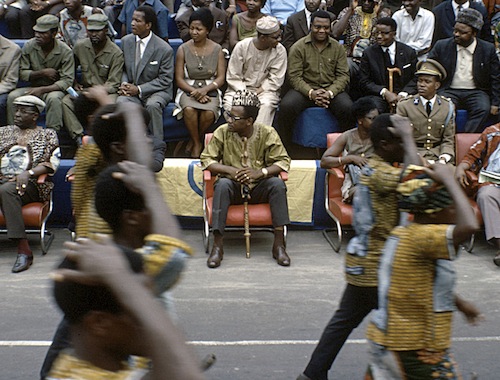I read this for the Read The World challenge as my book from the Central African Republic, which is where Andrée Blouin was born — although she didn’t actually live there for very long.
Her father, Pierre Gerbillat, was a French businessman with a transport company in what was then French Equatorial Africa. He saw Andrée’s mother, Josephine Wouassimba, dancing in a local village and decided he wanted to marry her. Although she was already promised to somebody else, he offered such a large dowry that her parents were persuaded.
He was forty; she was thirteen. And although they were married according to local custom, they were not actually married under French law — not only that, he was already engaged to a Belgian woman, who he married very soon. And after briefly juggling two wives, he left Josephine and sent Andrée to an orphanage for mixed-race children run by nuns in Brazzaville. She was at the orphanage from the age of three until she was seventeen, when she managed to escape, literally by climbing over the wall.
Then she worked as a dressmaker, and had a sequence of relationships with white men, before getting involved in the campaign for independence, first in Guinea and then the Belgian Congo, where she was Chief of Protocol for the newly independent Republic of the Congo for the very brief period before Mobutu overthrew the government and she had to flee the country, and move to France.
So she’s an interesting subject. Although the stuff which is most obviously notable about her — the politics — was not actually the most engaging part of the book, for me. The most powerful section is about severity of the orphanage, and the sheer cruelty of the nuns; and throughout the book the racial dynamics are particularly thought-provoking.
She was a mixed-race child at a time when they were so rare that they were shipped of to special orphanages and coerced to marry each other, to reduce their disruptive impact on society. And it made her even more of an outsider that she was cut off from normal African society for her entire childhood.
Then as an adult, she was a beautiful mixed-race woman who, despite having suffered at the hands of white institutions and individuals, was apparently only drawn to relationships with white men; one of whom she lived with, and had a child with, even though he was so racist that he would not allow her mother into their house.
And I don’t think she makes any comment herself about whether her partial whiteness made it easier or harder for her to be a woman taking a prominent role in the politics of independence, but it must have been relevant one way or another.
So there’s plenty of interesting material here. And it’s well written, for which the credit may go to Jean McKellar, who is credited as a ‘collaborator’; I don’t know exactly what that means in this case. It’s also out of print, though, and unless it sounds like it’s particularly relevant to your interests, I don’t think it’s so amazing that you need to seek it out.




